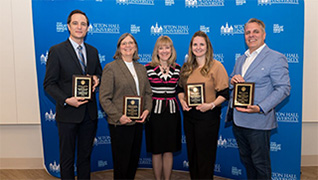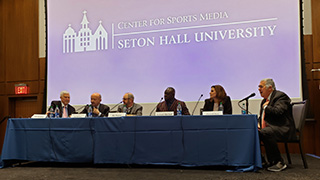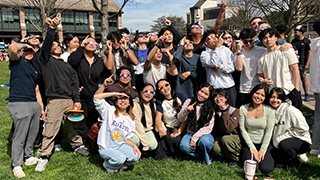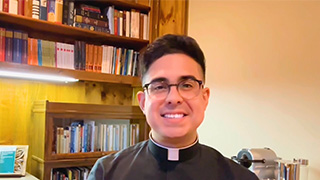Ph.D. Candidate Receives Grant from Royal Society of Chemistry to Celebrate the Periodic Table at Seton Hall
Thursday, December 5, 2019
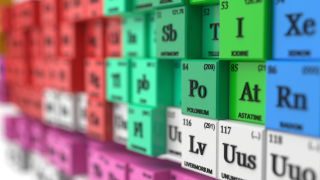
The grant is being used to help celebrate at Seton Hall "The International Year of the Periodic Table," and to show how chemistry is "present in everything around us."
Located in the UK, the Royal Society of Chemistry was formed from an amalgamation of the Chemical Society, the Royal Institute of Chemistry, the Faraday Society, and the Society for Analytical Chemistry; tracing its original Royal Charter back to 1848, the Royal Society of Chemistry is the oldest chemical society in the world.
"This grant from the oldest and most prestigious chemical society in the world is an extraordinary accomplishment by Marius Pelmus. His research and laboratory work is itself phenomenal," said Professor Sergiu Gorun of the Department of Chemistry and Biochemistry. But this is something more: this is the work of a scientist taking the initiative and doing the work necessary to share his love of science with others. This is the work of a Great Mind and a Servant Leader."
The first of several planned events, on December 4, Pelmus led a Red Cabbage pH Indicator Experiment that was held in McNulty Hall and attended by more than 100 students and faculty. The chemistry experiment used household products (i.e. lemon juice, vinegar, water, 5% baking soda solution, 1% hand soap solution, cleaning products, etc.) along with the Red Cabbage pH indicator to allow students to determine pH in tested products.
In further celebration of The International Year of the Periodic Table, presentations about the elements of the periodic table will be held throughout the day on December 9, from 9 a.m. – 7 p.m. in the Jubilee Hall Auditorium.
A presentation on the history of the periodic table, often referred to as "the chemists alphabet" because it makes possible communication between these scientists at an international level without the use of foreign languages, will focus on the work of Dimitri Mendeleev "The father of the Periodic Table."
Presentations will also discuss the abundancy of elements in the universe, the Earth and on macro- and micro-elements present in the human body – and nutritional sources (minerals, plants, animals) as well.
Future presentations will include a workshop and experiments that will focus on the use of electronics (especially on the rare metals), greener gadgets, including solar panel trees, lithium ion (with emphasis on the 2019 Nobel Prize in Chemistry) and USB rechargeable batteries as well as the importance of recycling with a focus on electronic waste.

